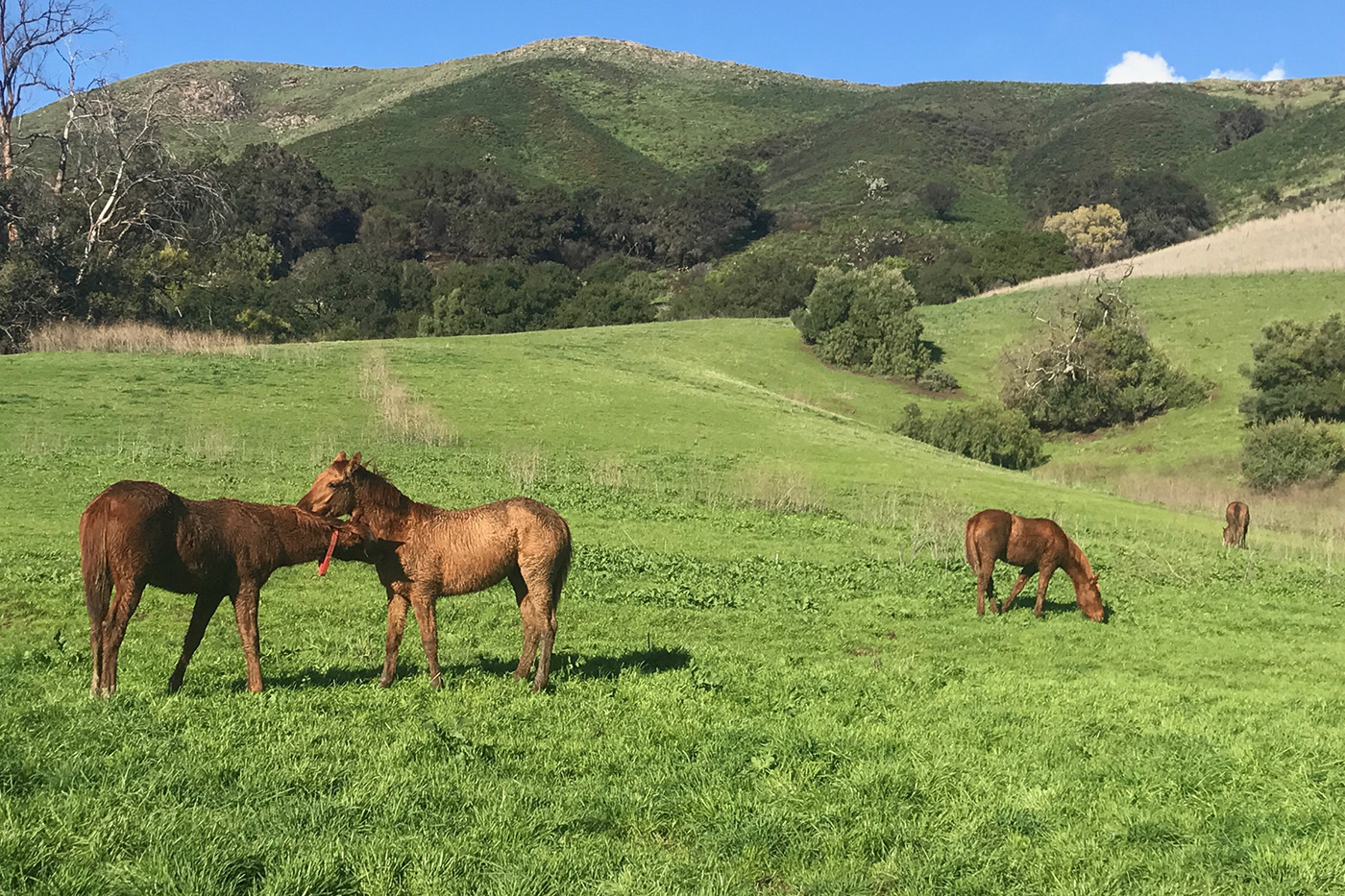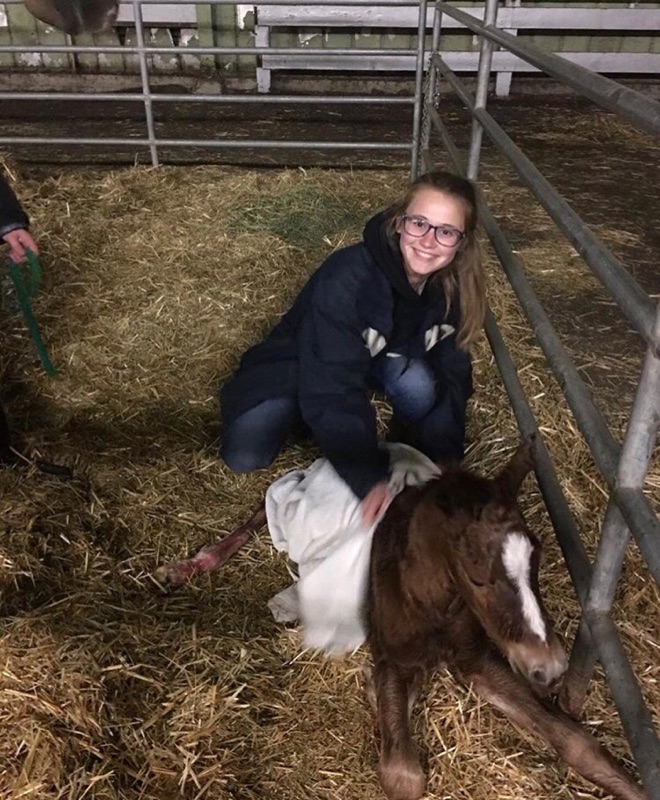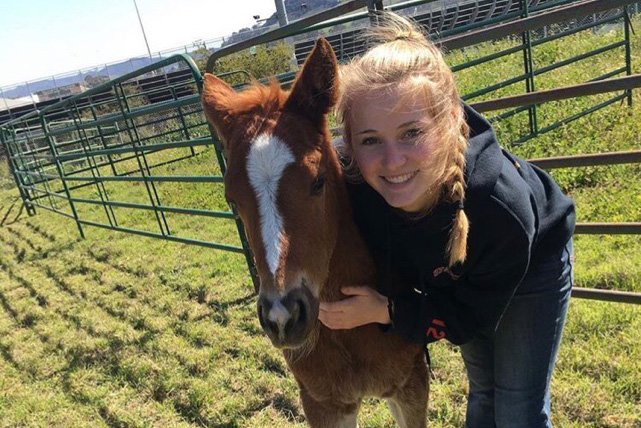It is nighttime and the street lights are illuminating the Poly Canyon Village apartments. Inside, child development junior Kim Dougherty is getting ready for bed. Her face is washed and her hair is thrown up into a ponytail. It is when she hops into bed, comfortable and ready to fall asleep, that she gets the text: her mare is in labor. She stumbles out of bed, hops on her bike, and races down to the beef unit. Arriving just a few minutes late, she gets to meet her foal.
Dougherty is one of three student managers of Foaling Enterprise (ASCI 290). She has always had an interest in horses, but never knew if she wanted to pursue it further. Her parents are from the midwest, so she often visited with them and played with horses there as a child. Upon arriving at Cal Poly, she began looking into minors and stumbled up on the equine science minor. After taking Principles of Animal Science (ASCI 112), she decided to pursue the minor, leading her into the foaling management position she holds today.
“It’s a really cool experience to know how to help and be present when something is born and you can be the first human to ever come into contact with it,” Dougherty said.

The foaling enterprise is managed by professor Julie Yuhas-Volk and offered every Winter and Spring as a two-quarter commitment class. The three student managers who help Yuhas-Volk with the class are interviewed and selected by her.
Animal science junior Dionne Rasquinha is one of the students managers and describes the class as fun, hard work. She said she enjoys that students of all majors are able to take the class and that she can help teach the first-timers.
“It’s interesting to see how much I’ve learned and that I can help them catch up in a way,” Rasquinha said. “I think it’s nice that other majors can be involved with it so you can pursue a degree you are more interested in, but if you’re interested in horses, be a part of that too.”
One of the first and most basic things first-time students learn in class is how to properly address the animals. A baby horse is called a foal while a female horse is referred to as a mare. The department’s materials describe the class as having students actively participate in multiple components of mare care, 24-hour foal watch, assisting with foaling, and all aspects of neo-natal care. After the birth of the foals, students handle and halter-train them while providing all care and management.
Dougherty explained that the first half of the class is primarily lecture-based to prepare students for the Learn by Doing experience of foaling. Students learn what the process is like and what to do if something goes wrong. Dougherty herself did not know much about foaling or working with horses before taking the class, but said she has learned a lot from it.
“The enterprise has very much encompassed the Learn by Doing mantra in that you are working with the horses whenever you are on shift, which could be every day,” Dougherty said. “It’s very hands-on and you get in there and if the situation calls for it, you are pulling a baby horse out.”

The second half of the class is where the real Learn by Doing comes into play. During the 24-hour foal watch, students check on the horses in their stalls every 15 minutes. They perform health checks and assist with the birthing of horses. Once the foals are born, the students rub them down with towels and give them their first experience with human contact. Within an hour, the foals are walking and within two, they begin to nurse.
“Based on my experience as far as our mares go, they are very open to us being around them and their foals,” Dougherty said. While some mares can be “foal proud” and protective over their babies, most at the foaling barn are not aggressive or dangerous, according to Dougherty.
She credits a majority of the mares’ trust in them to the building of their relationship before birth. While the horses come into contact with many people, Dougherty said they know who you are and trust you.
The foaling class is one of 35 enterprise classes offered by the Animal Science Department for the 2018-2019 school year. According to Leanne Berning, associate dean of the department, enterprise classes have been offered by the college for decades. She said they emerged out of a Learn by Doing need for students to work with the animals already on campus, coupled with faculty members’ expertise for a match made in heaven.
“My favorite part is seeing people get used to the reality of taking care of a living being,” Berning said. She likens the experience to a reality check because students do not just get to see the cute babies, but instead the nitty gritty part of what goes into fostering life.
The spectrum of enterprise classes offered range from bull testing to working with Iberian pigs to marine mammal health.
Students of all majors are eligible to take enterprise courses with permission from the instructor, however some classes may have different prerequisites to be considered. A list of enterprise classes offered each year can be found outside the department office (building 10, room 141).
Though not everyone gets to receive hands-on experience to explore a passion, Berning, Dougherty, and Rasquinha all believe the opportunities offered through these enterprise classes are special because they further educate students on their interests.
“It’s a really great hands-on experience that you can’t really get anywhere else,” Dougherty said. “As far as after college, I don’t know if I could go anywhere and be like, ‘I don’t know much about this,’ and be able to hop in and learn how. You get to gain that experience here.”

